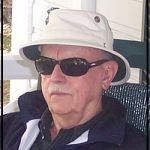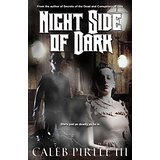A special treat today. We have a post from Caleb Pirtle III. He’s been  in the publishing arena for 40 years. He’s worked at pretty much every level. He’s made a name for himself at each of those levels. He’s had sixty-five books published, three scripts made into TV shows, and countless shorter pieces. So when he speaks, it’s a good idea to listen. So, here he is giving us the secret of great writing. Caleb —
in the publishing arena for 40 years. He’s worked at pretty much every level. He’s made a name for himself at each of those levels. He’s had sixty-five books published, three scripts made into TV shows, and countless shorter pieces. So when he speaks, it’s a good idea to listen. So, here he is giving us the secret of great writing. Caleb —
I have lived in cities.
I have fought the traffic.
I have battled the crowds.
Didn’t like it.
Don’t want to go back.
Personally, I prefer Small Town America.
Little towns are distinctive.
The ones I like are off the beaten path.
They are self-sufficient or should be.
And an odd assortment of people walk their streets.
Dark.
Or sunny.
Out of sight.
Or in plain daylight.
It doesn’t matter.
Each of them has a story to tell.
They may not want it told until they die.
It may be the reason why they die.
Small towns think they have their secrets, but almost everyone knows what the secrets are. By mid-morning, everybody knows who did what to whom and why – and how much money or sex was involved.
Small towns are partly fact and partly fiction, and somewhere through the years, the lines began to blur.
That’s why so many great novels have been written in or about small towns.
They are full of love.
And love lost.
They are full of hate.
And sardonic smiles.
They are smitten by greed.
And jealousy.
Ambition.
And revenge.
We know them even if we have never met them.
They are our neighbors.
They are us.
No one ever captured the spirit and soul of Small Town America as well as Sherwood Anderson in his Winesburg, Ohio, a collection of short stories featuring an array of of people who, by fate or fortune, both good and bad, have chosen reside in the small Midwestern village. When cleverly woven together, their lives become the stuff of an unforgettable novel.
In his books and short stories, Anderson never emphasized plot or action.
Instead, according to one critic, he used “a simple, precise, unsentimental style to reveal the frustration, loneliness, and longing in the lives of his characters.”
His voice was unmistakable, and his writing greatly influenced and served as a guidepost for the works of William Faulkner, Ernest Hemingway, John Steinbeck, and Thomas Wolfe.
Anderson knew that all good novels were tied together with a little fact and a little fiction. Only imagination knew the difference.
Fact sounded like fiction.
Fiction becomes fact.
Imagination made them both real and believable.
The reader never knew which was which, nor did the reader care.
Anderson once wrote: “The life of reality is confused, disorderly, almost always without apparent purpose where in the artist’s imaginative life there is purpose. There is determination to give the tale, the song, the painting, form – to make it true and real to the theme, not to life …
“I myself remember – with what a shock – I heard people say that one of my own books, Winesburg, Ohio, was an exact picture of Ohio village life.” Nothing could have been farther from the truth.
As Anderson wrote: “The book was written in a crowded tenement district of Chicago. The hint for almost every character was taken from my fellow lodgers in a large rooming house, many of whom had never lived in a village.
“The confusion arises out of the fact that others beside practicing artists have imagination. But most people are afraid to trust their imaginations, and the artist is not.”
That, when it’s all said and done, may be the secret of great writing.
Find a little fact.
Let your mind spill out a little fiction.
Work them together.
Figure out a hook.
Then trust your imagination.
And let’s see where it leads you.
JIM: Please add your thoughts on the subject.
You can find more about Caleb at: http://venturegalleries.com/about/caleb-pirtle-iii/
